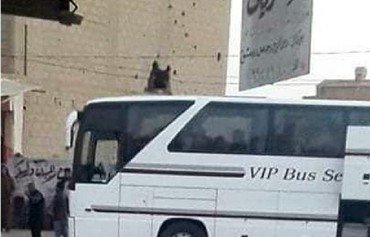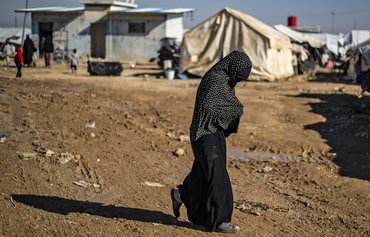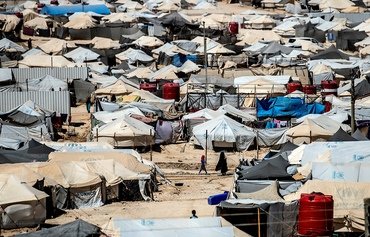Since the Syrian regime reported the country's first novel coronavirus (COVID-19) infection on Sunday (March 22nd), there has been growing concern in regime-controlled areas that not enough is being done to prevent its spread.
Though a curfew has been announced in regime-controlled areas of Deir Ezzor, this has been largely ignored, a local activist said, with crowds continuing to gather at bakeries, ATM machines and in the markets.
The curfew, a measure to prevent the spread of the virus, was accompanied by the stoppage of all public and private transportation, Deir Ezzor activist Jamil al-Abed told Diyaruna.
There has been an acute shortage of flour in the eastern province, he said, so the civilian population has continued to gather by the hundreds outside bakeries.
![A street market in Deir Ezzor remains open and active despite concerns over the spread of coronavirus. [Photo courtesy of Euphrates Post]](/cnmi_di/images/2020/03/25/23216-Deir-Ezzor-market-600_384.jpg)
A street market in Deir Ezzor remains open and active despite concerns over the spread of coronavirus. [Photo courtesy of Euphrates Post]
Meanwhile, the price of basic food items is soaring, and regime-affiliated agencies have not taken measures to prevent price gouging or penalize merchants exploiting these circumstances, he said.
Concern in Kurdish-held area
In the Kurdish-held north-east, aid groups and officials have warned that an outbreak could ravage the region, where some 100,000 people live in displacement camps and medical supplies are already running low.
"Even before the novel coronavirus arrived, our needs were huge, and now, in light of the outbreak, we need even more support," said Jawan Mustafa, head of the autonomous administration's health department.
Unlike Syria's north-west, where UN aid enters via Turkey, the north-east is deprived of cross-border channels for UN medical assistance.
Deliveries from within Syria, on the other hand, require permission from the regime, which has yet to extend relief.
The International Rescue Committee (IRC) has warned that an outbreak of novel coronavirus in northern Syria could be one of the worst the world has seen.
"With the UN no longer able to provide medical supplies from across the border, the ability of many humanitarian organisations to meet the healthcare needs of those in camps such as al-Hol... has already been compromised," the IRC said.
Mustafa warned that displacement camps are the gravest concern, as social distancing measures cannot be applied in such settings.
"The camp is, in and of itself, a social gathering and this is the problem," he said, adding that to prevent the virus from reaching the settlements, officials have restricted the entry of relief workers except in urgent cases.
In the event of an outbreak, a large tent in each settlement will be transformed into a quarantine zone, he said, adding "there is not much else we can do".
Regime prisons at risk
UN envoy to Syria Geir Pedersen on Tuesday called for a nationwide ceasefire to allow for a better response to the threat of the novel coronavirus.
He called for the mass release of detainees and demanded full and sustained humanitarian access to all parts of the country.
Human rights groups warned Tuesday of a "major humanitarian catastrophe" if the virus hits the regime's overcrowded and squalid prisons, where inmates are routinely denied even routine medical care.
Amnesty International and Human Rights Watch have long documented abuses in the regime's prisons, including executions, torture and starvation.
In a Monday statement, 43 Syrian activist groups pressed the government for action, calling for the release of political prisoners and halting of all new arrests.
They also called on the regime to open detention facilities to the World Health Organisation and the International Committee of the Red Cross.

![A video screenshot shows throngs of residents gathered in front of a bakery in Deir Ezzor. [Photo courtesy of Euphrates Post]](/cnmi_di/images/2020/03/25/23214-Deir-Ezzor-bakery-600_384.jpg)






